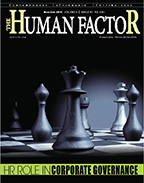PROFESSOR VASANTHI SRINIVASAN OF IIM-B Age, Generations and India A study to understand the manner in which generations manifest at Indian workplaces Issue Date - 01/03/2013 |
 Generational diversity is one of the most visible forms of diversity in Indian organisations, where rapid economic growth and a large number of young entry-level professionals pose a significant challenge in creating inclusive and collaborative workplaces. In many ways, the business culture in India is a reflection of the complexity and diversity of the country as a whole. Generational diversity is one of the most visible forms of diversity in Indian organisations, where rapid economic growth and a large number of young entry-level professionals pose a significant challenge in creating inclusive and collaborative workplaces. In many ways, the business culture in India is a reflection of the complexity and diversity of the country as a whole. In our country, the variation within a generation is likely to be accentuated by factors such as rural/urban background, nuclear and joint family set up, caste, religion, beliefs, norms, ethics and other socio-cultural factors. Thus, the applicability of the western classification of generations, namely, veterans, baby boomers, generation X and generation Y, based on age and defining life experiences such as World War II and the Civil Rights Movement, is not only questionable but also inadequate in the Indian context. The study aims to understand the manner in which generations manifest at Indian workplaces. One of the most cited areas of conflict between generations is the different priorities given to values across generations, this research chooses values as a platform through which differences between individuals can be understood. The study attempts to track and explain these value differences through a combination of socio-demographic profiles of the respondents. This is also critical for embarking on further work on diversity practices. OBJECTIVES OF THE PILOT STUDY 1 Can values be used as a platform to identify generational differences? 2 How do value priorities differ across age and other socio-demographic profiles? 3 What is common in values across various profiles? METHODOLOGY The pilot study was rolled out to a sample of 326 working professionals from the IT and Infrastructure sectors in South India. The Rokeach Values Survey (Rokeach, M., The Nature of Human Values, New York: The Free Press, 1973) was used as the survey instrument, allowing respondents to rank order 18 terminal and 18 instrumental values according to their importance. |
KEY FINDINGS All responses, 294 (90.1 percent), were used for the analysis. The average age and tenure within the organisation of the sample were 33 years and 3.1 years respectively, 52 of the 294 respondents were females. Of the total, 28.6 per cent hailed from non-metro cities, 68.7 per cent were married and 41.5 per cent lived in nuclear families. Terminal values: The value ranks from the pilot study were mapped to the popular generational categories based on age groups (20-30 years, 30-40 years and above). The study confirmed that there were no significant differences in the terminal value differences based on age. Family security was the top most value across the entire sample, in line with the Indian mindset and culture. Health, self-respect, comfortable life were featured as the next three high priority values. India is a country with varied religions and caste systems, where spirituality is given high priority. However, it was surprising to find that salvation was one of the bottom most values. Similarly, violence, a world of beauty and mature love were other terminal values, which were found to be of lesser importance. Instrumental values or preferable modes of behaviour: It was observed that there are no significant differences in instrumental values either. The increasingly pervasive nature of globalisation at workplaces requires a uniformly progressive mindset supported by a need for achievement, which could explain why ‘ambitious’ and ‘broad-minded’ were featured as the top most values. ‘Capable’ and ‘responsible’ were the other two top priority values. ‘Imaginative’, ‘self-controlled’, ‘forgiving’ and ‘loving’ were the least prioritised instrumental values. CONCLUSION AND NEXT STEPS As larger number of young workers migrate to cities for employment, it is likely that their values from formative years may strengthen or weaken. Accordingly, the HR fraternity needs to be sensitive to how these value differences manifest in organisational interactions, training and development, selection systems and managerial behaviours. Examining and harnessing similarities across generations will enable organisations to effectively broker and minimise differences across generations. In order to validate the pilot study findings, the main study survey will be administered to a large sample across diverse sectors. Also, differences in behaviours will be understood through triangulation and qualitative interviews. Along with building a scholarly body of knowledge on generational diversity in the Indian context, the present study will also create key learning for leaders on the leadership strategies needed in a multigenerational context. |
Schweta Chaturvedi
|
|
|



